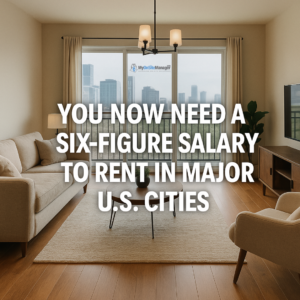The American dream of affordable housing is slipping away—not just for homebuyers, but for renters too. As housing prices continue to climb and inventory remains critically low, a new report from Zillow reveals that even renting now demands a six-figure income in many of the nation’s biggest cities.
Read on to understand how we got here, what it means for renters, and what experts say needs to change.
Source: CBS News – Renters now need six-figure incomes in many U.S. cities
The Cost of Renting Has Soared Nationwide
According to Zillow, the average U.S. monthly rent has skyrocketed to $1,858—a sharp increase from $1,440 in April 2020. That’s a nearly 30% jump in just four years. Meanwhile, incomes haven’t kept pace: median household income has risen only about 22.5%, from roughly $67,500 to $82,000.
So what does this mean? If you’re following the long-standing rule of thumb that rent should not exceed 30% of your income, you now need to earn about $80,000 per year to rent the average apartment in the U.S. comfortably.
And in many cities? That number is significantly higher.
Where Six Figures Are Now the Bare Minimum
Zillow’s report identifies eight major U.S. cities where the average renter must earn at least $100,000 per year to afford a typical rental:
| City | Required Annual Income |
|---|---|
| New York City | $135,000+ |
| Boston | $127,000 |
| San Francisco | $123,000 |
| San Jose | $120,000 |
| San Diego | $111,000 |
| Los Angeles | $109,000 |
| Miami | $106,000 |
| Riverside, CA | $102,000 |
Let’s put that into perspective: many essential workers, including teachers, emergency responders, and healthcare workers, do not earn salaries anywhere near these thresholds, especially in early-career stages.
Why Is This Happening?
Several overlapping factors are driving the rental affordability crisis:
1. Housing Supply Hasn’t Kept Up
Despite a steady pace of construction in some regions, the U.S. still faces a severe housing shortage. Demand far outpaces supply, especially in urban areas, which pushes prices higher across the board.
2. Homeownership Is Out of Reach
High interest rates and home prices are discouraging many would-be buyers from purchasing homes, pushing more people into the rental market and creating more competition for fewer units.
3. Wages Are Lagging
While rent has climbed nearly 30% since the pandemic began, incomes haven’t kept pace. Zillow economist Kara Ng notes that many renters are being forced to spend a greater portion of their paychecks on housing, leaving less for everything else—savings, food, transportation, or even healthcare.
The Impact on Renters
This shift isn’t just a financial inconvenience—it’s a growing economic concern:
-
Cost Burdened Renters: According to HUD, households that spend more than 30% of their income on rent are considered “cost-burdened.” With average rents nearing $2,000/month, many renters now fall into this category—even those earning well above minimum wage.
-
Limited Options: As rents rise, families are often forced to downsize, relocate farther from urban centers, or delay key life milestones such as marriage or having children.
-
Widening Inequality: Rent increases disproportionately impact communities of color and low-income households, further exacerbating the wealth gap.
What Needs to Change?
Housing advocates and economists agree: solving this crisis requires multi-faceted policy solutions and a focus on long-term affordability.
Potential solutions include:
-
Expanding the Low-Income Housing Tax Credit (LIHTC) to incentivize affordable housing development.
-
Zoning reform to allow for more multifamily developments in urban and suburban areas.
-
Rental subsidies and housing vouchers to help low- and middle-income families.
-
Rent stabilization policies in markets experiencing extreme price surges.
Rachel Fee of the New York Housing Conference emphasized that “renters just can’t keep up” and that public investment is key to ensuring housing remains attainable.
Final Thoughts: Renting in 2025
The idea that renting is a more flexible, affordable alternative to homeownership is becoming outdated—especially in cities where six-figure salaries are now required just to rent modest apartments.
As rents continue to climb and wage growth stalls, more Americans will face difficult decisions about where they live, what they can afford, and how they plan for the future.
Whether you’re a renter, a policymaker, or an investor, the message is clear: the rental market is at a tipping point.
Source:
CBS News – “Renters now need six-figure incomes in many U.S. cities”
https://www.cbsnews.com/news/rent-apartments-zillow-homes/

